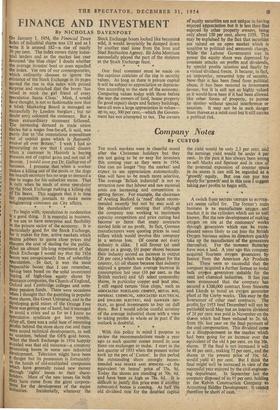Company Notes
By CUSTOS THE stock markets were in cheerful mood after the Christmas holidays but they are not going to be so easy for investors this coming year as they were in 1954. One can no longer 'buy the market' and expect to sec appreciation automatically. One will have to be much more selective. The average 'British industrial' is not so attractive now that labour and raw material costs are increasing and competition is getting fiercer. For example, the chairman of Aveling Barford (a 'road' share recom- mended recently but not by me) said at the shareholders' .meeting that although the company was working to maximum capacity competition and price cutting had become so fierce that many contracts carried little or no profit. In fact, German manufacturers were quoting prices in road rollers which would involve this company In a serious loss. Of course not every industry is alike. I still favour (a) steel shares as a group, (h) paper shares because their industry scored an increase in output (20 per cent.) which was the highest for the country, (c) oil shares because that industry enjoyed a greater than average increase in consumption last year (10 per cent. in the British market) and (d) select commodity shares, in particular copper and lead zinc. I still regard certain 'blue chips,' such as ASSOCIATED PORTLAND CEMENT, METAL BOX, IMPERIAL CHEMICAL, ASSOCIATED ELECTRICAL and ENGLISH ELECTRIC, and HAWKER SID- DLEY, as good investments to buy on dull days. But I would advise careful scrutiny of the average industrial share with a view to taking profits in whole or in part if the outlook is doubtful.
With this policy in mind I propose to review the recommendations made a year ago as each quarter comes round in case there are exchanges to make. I start in the last quarter of 1953 when the present writer took up the pen of 'Custos'. In this period the outstanding share strongly recom- mended was MARKS AND SPENCER—at the equivalent 'ex bonus' price of 33s. 9d. Today the shares are standing at 70s. 6d. and have been as high as 78s. 6d. It is difficult to justify this price even if another substantial bonus is coming. At half the old dividend rate for the doubled capital
the yield would be only 2.3 per cent. anti the earnings yield would be under 4 per cent. In the past it has always been wrong to sell Marks and Spencer and in view of the potential expansion of counter space in its stores it can still be regarded as a 'growth' equity. But one can pay too dearly for' growth' and in this case I suggest taking part profits to begin with.
* •
A switch from BRMSII OXYGEN 10 BUTTER- LEY seems called for. The former's main business is to manufacture oxygen and market it in the cylinders which are so well known. But the new development of making oxygen on site at the customers' works through generators which can be trans- planted seems likely to cut into the British Oxygen business unless its directors quickly take up the manufacture of the generators themselves. For the moment Butterley have won a lead. A year ago this company acquired fourteen oxygen generators by licence from the American Air Products Inc. These were so successful that the company acquired a further licence to instal bulk oxygen generators suitable for the steel and chemical industries. It has just been announced that the company has secured a 000,000 contract from Stcwarts and Lloyds to instal an oxygen generator plant at the Corby works. This may be the forerunner of other steel contracts. The profits for 1953 (end December) will not be published until May but an interim dividend of 24 per cent. was paid in November on the shares which had been reduced to 2s. 64. from 10s. last year on the final payment of the coal compensation. This dividend came as a disappointment to the market which had been going for an increase over the equivalent of the old 6 per cent, on the 101. shares. If the final is not increased it will be 48 per cent., making 72 per cent., and the shares at the present price of' 39s. 64. would yield 41 per cent. But I think the final might well be increased in view of the successful year enjoyed by the civil engineer- ing department. In September last the company disposed of its 95 per cent. holding in the Kelvin Construction Company to Armstrong Siddley Development. It cannot therefore be short of cash.


























 Previous page
Previous page